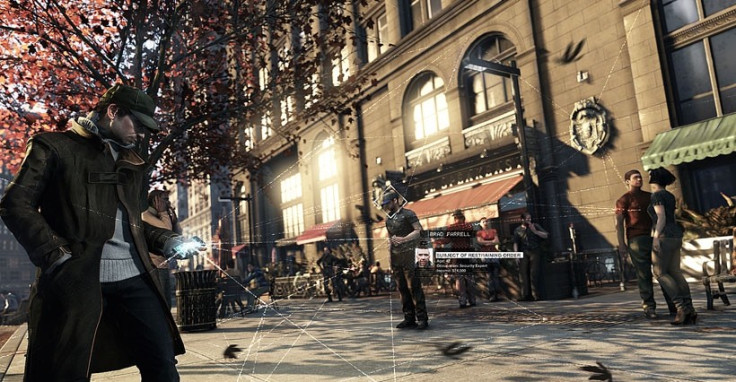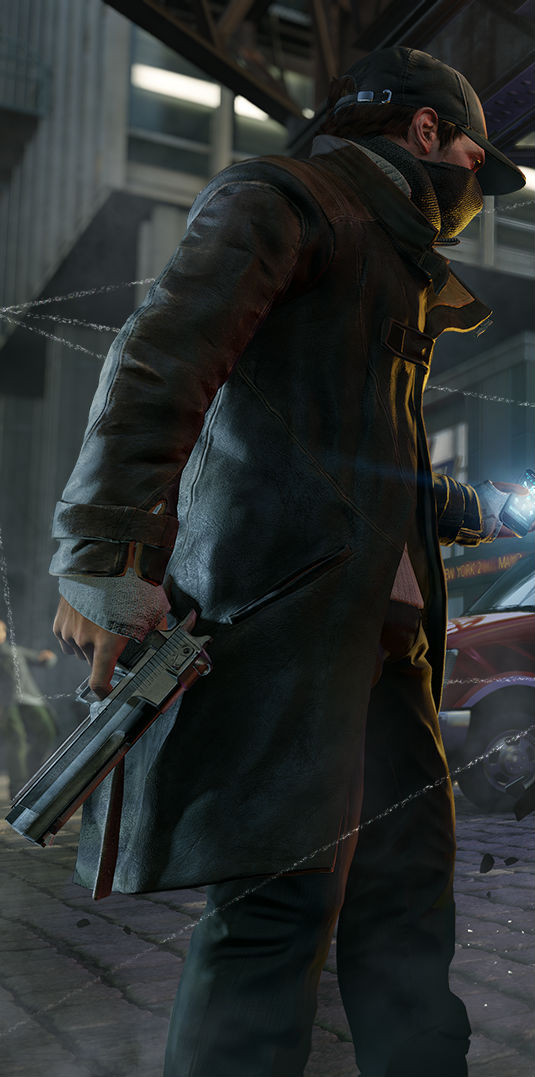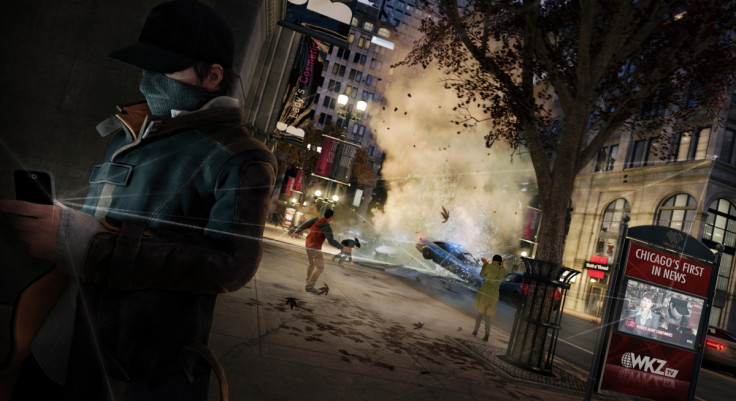Watch Dogs Review

- Developer – Ubisoft Montreal
- Publisher – Ubisoft
- Platforms – PS4 (tested), Xbox One, PS3, Xbox 360, Microsoft Windows, Wii U
- Release date – Out now
- Price - £44.99
Watch Dogs
In Watch Dogs, the player carries a smartphone that can hack anything, from ATMs to traffic lights. He explores a heaving, near-future version of Chicago. Every character around him has a name. The player can scan their phones to pull up any information, from medical history to sexual preferences. He can buy cars, go shopping, have lunch. He can find collectibles, side missions and secrets.
By the numbers, Watch Dogs is perhaps the largest and most detailed sandbox game to date. But it doesn't feel like it, and that's the point.
The player and his avatar - underground hacker Aiden Pearce - are always on the outside. The almost God-like power afforded by the hacking tool turns Watch Dogs into a game about voyeurism, where the majority of the player's time is spent gleaning information from the world around him without being detected.
Walk down a street in Watch Dogs with the phone open, and you can enter the private lives of everybody you pass. Some are normal working stiffs. Others are expenses cheats, cancer patients, ex-cons. This ability you have, to know everything about people without speaking to them directly, is what sets Watch Dogs apart from every open-world game before it.
Freedom as a contradiction
In Grand Theft Auto, Skyrim and others like them, the complexity and breadth of the world is there to make players more engrossed in it, more included. But in Watch Dogs, you feel outside of the world, above it, like you can decipher all of its mysteries without having to leave your car.

This is the open-world turned back on itself, freedom as a contradiction. The more you walk the streets of Chicago, the less a part of it you feel.
You know these people have brain tumours, ex-husbands and debt problems, but you can do nothing to intervene. You're the camera on the subway platform, the ghost at the feast. We're used to playing the trailblazer in games, the lone hero, the rogue, but never before Watch Dogs have we felt quite so isolated. The game achieves that by presenting a functioning, intricate society, but limiting our access to mere spying.
We truly are Aiden Pearce, the underworld crook, the silent watcher, the ghost. Watch Dogs' open-world becomes as Tantalus' plum.
Random, uncontrolled, anodyne
It's a level of narrative cohesion rarely, if ever, achieved by a sandbox game.
Depending on who's controlling him, Rockstar San Diego or the player, Red Dead Redemption's John Marston is a completely different man: in cutscenes a reflective criminal with a heart, in gameplay a veritable mad man, who shoots prostitutes and goes hunting for flowers.
The solution until this point has been to skirt the issue, to render the protagonist mute and let the player's actions define who she or he is. But as Skyrim and Fallout have shown, that typically compromises the story. It becomes random, uncontrolled, anodyne. The author's presence is merely hinted at, so the narrative events lack meaning.
Contrary to other sandbox games, in Watch Dogs you always know what your mission is and why you're doing it.
If Watch Dogs really is the first example of a truly next-gen game, it has nothing to do with graphics (amazing as they are) or size. Rather, it's that Ubisoft has found an elegant solution to the problem of player versus maker. What you do in Watch Dogs almost always complements the writers' vision of your character and his motivations.
In an open-world game, especially one so large, that's a massive achievement.
Straight face
Writing, in fact, is Watch Dog's best asset. The dialogue doesn't sing and the story is hardly complex, but the characters and world are consistent. Despite all the technophobia, all the hysteria about what hackers can do, the game holds a straight face.
The creators clearly have complete conviction. Compared to the Assassin's Creed series, which would go off at strange tangents, Watch Dogs lays down its rules from the start and never betrays them.

It's simple, it's tight and in the game's fictional world it all makes sense. Characters all have a distinctive voice and role and you can track, easily, one narrative beat to another. Even the most outlandish campaign missions are firmly contextualised.
Contrary to other sandbox games, in Watch Dogs you always know what your mission is and why you're doing it. The story flows like data through a network – fast, smooth, traceable.
It's interlaced with the greatest car chases ever in a videogame. Police pursuits in Watch Dogs work like the opening of Drive, where the objective isn't simply to outrun the cops, but hide from them. These "Stealth Driving" mechanics work like a charm.
The most tense moment in the game is when, in the midst of a getaway, you pull into an alley and hit "hide in car". Aiden cuts the engine and kills the lights. He pulls his hood up, and waits. A police cruiser crawls along the streets. It shines a blinding search light into your car, trying to see who's in there. Sometimes you get away with it – you wait for the car to pass then calmly restart the engine and drive away. Other times, your cover is blown, and then it's a case of fumbling the ignition and reversing onto the next street before the cops can jam you in. Play these sections in first-person view mode and the atmosphere is incredible.
Bloody and chaotic
Shootouts, too, are appropriately high-pressure. A large influence seems to have been the bank robbery gun battle from Michael Mann's Heat. The weapons in Watch Dogs are loud and inaccurate. If you're up against three guys or more, then you have a problem. It's bloody and chaotic.
The sound of your silenced pistol thumping into someone's chest is just as stomach-churning as the screams of his friends, as they fumble for a radio and call in reinforcements. If your gun fight spills into the streets, the cacophony of terrified pedestrians, blaring sirens and cars crashing into each other as you sprint over the road will be enough to make you grit your teeth. There's nothing more horrendous than ramming a target's car off the road then pursuing him on foot through Chicago's parks, shopping malls and playgrounds.
Only when you've finished him off with a rushed burst of handgun fire will you be able to breathe again.
Conclusion
Watch Dogs is the open-world game as it should be: detailed, evocative and more than just an outlet for player's childish whims. It's environments and mechanics aren't designed expressly around fun. They tell us about our character. They reflect the zeitgeist of the game's fictional world. Watch Dogs in fact belies the use of the term "sandbox". To call it a sandbox would be reducing it to simple fun – to the level of something so adolescent as GTA V.
If Watch Dogs is going to impress one thing on the coming generation of videogames, it'll be a need to redefine and re-examine what open-world should mean. The money, time and talent it takes to create games of this magnitude shouldn't be spent entirely on making something that's merely enjoyable, or colourful. As in Watch Dogs, it can be used to produce work of real meaning.
Scores:
- Gameplay: 10/10 – Amazing car chases, fantastic shootouts and a thought-provoking hacking mechanic, all of which complement the game's story
- Graphics: 10/10 – The best looking game so far on consoles
- Writing: 8/10 – Watch Dogs is written like a confident, perhaps slightly more intelligent than usual Hollywood thriller. That it stays poker-faced throughout is admirable
- Sound: 9/10 – Solid acting, very loud guns and a superb original score from 30 Days of Night composer Brian Reitzell
- Replay value: 9/10 – On and on it goes. The world of Watch Dogs is enormous
- Overall: 9/10 – An intelligent, violent redefining of the open-world genre. A technical benchmark for games to come
Want to know what our review scores mean? Have a look at how we review games.
© Copyright IBTimes 2025. All rights reserved.






















